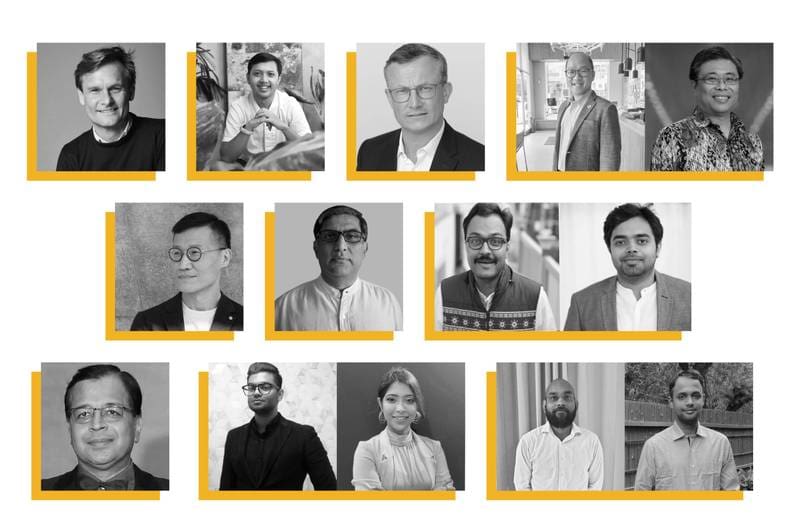AMSTERDAM – Fashion for Good has selected ten new innovators to participate in the third batch of their South Asia Innovation Programme. This batch includes innovators from eight countries adding Malaysia, Singapore and Indonesia to the roster. With this cohort Fashion for Good expands it’s regional programme deeper into the South East Asian market, further solidifying the platform’s presence and shining a spotlight on innovations from the region.
The new batch includes exciting innovations in material solutions such as leather alternatives from mycelium and technologies producing biopolymers from locally sourced feed stocks like Jute and Cassava,which are available in abundance and have the potential to be feasible alternatives to plastic. Other game-changing technologies include inks produced from greenhouse gas emissions, innovations in dyeing and finishing, dyes from waste from the tea industry, inspection technologies and innovations in wastewater treatment.
“After five months of rigorous scouting and screening, we’ve selected innovators across multiple cutting-edge technologies and from three new countries, further expanding our footprint in the South East Asia region. Collaborating with our global network of partners, we’re excited to help this group of innovators to scale their solutions and further drive the transformation across the fashion supply chain.” –Katrin Ley, Managing Director, Fashion for Good
The innovators will receive bespoke support from Fashion for Good throughout the nine-month programme. Apart from assessing the impact of their solutions on the fashion industry, they will also work closely with Fashion for Good’s network of global partners on pilot projects and implementation activities, developing their path to scale their technologies within the value chain.
Having launched just over a year ago in January of 2020, the South Asia Innovation Programme has already made significant steps in the region, engaging nine regional and global corporate partners and driving pilot and implementation projects in the region with the first two batches of innovators and prominent brands and manufacturers. Expectations for the third batch are equally optimistic.
The third batch of innovators joining the South Asia Innovation Programme are: Aquaporin (Denmark), Chlorohemp Agrotech(India), Demeta (France), Deven Supercriticals (India), Graviky Labs (India),GreenHope (Singapore), MYCL (Indonesia), Quantum Polychemics (Bangladesh),t-hues (Sri Lanka) and Wise Eye (Hongkong).
AQUAPORIN (DENMARK)
Aquaporin is a cleantech company dedicated to solving global challenges of water pollution and scarcity. Their solution is an energy-efficient industrial water filtration technology mimicking biological membranes, capable of recovering up to 95% of clean water for reuse.
CHLOROHEMP AGROTECH (INDIA)
Chlorohemp Agrotech is working towards commercialising the hemp value chain in India by developing large scale fully integrated hemp processing units and applying cutting edge biosciences to develop an effective research database on Indian Hemp varieties. Hemp requires far less input than cotton, grows like a weed, and the fabrics are antibacterial, strong and breathable making them desirable for both summer and winter.
DEMETA (FRANCE)
Demeta is a Green Chemistry company specialising in the development of new high-performance materials and chemicals. DEMETA is currently developing bio-based pigments and dyes not only as viable alternatives to current petro-based material, but also more performant in terms of properties and safer in terms of toxicity.
DEVEN SUPERCRITICALS (INDIA)
Deven Supercriticals is an innovation driven company dedicated to supercritical CO2 based processing, offering an efficient single-step dyeing as well as finishing technology for man-made, natural and blended textiles. Their innovative supercritical CO2 based dyeing allows the use of traditional dyes, improved dye utilisation, easy scale-up and less than half the batch time needed in current supercritical CO2 dyeing processes.
GRAVIKY LABS (INDIA)
Graviky is a material innovation startup that turns end-of-life carbon emissions into industrial grade materials, helping manufacturers produce more sustainably and creating a more positive impact on climate. Emissions are recycled into products such as screen-print and inkjet inks, dye stuff and transfer inks that could be used in apparel and packaging applications.
GREENHOPE (INDONESIA)
Greenhope is a social technology enterprise manufacturing biodegradable technologies to address hard-to-recycle items that are too small, contaminated, not economically viable, or destined for landfills. Their Ecoplas bioplastic sources starch from local farmers and turn it into sustainable packaging for apparel, food, and non-food applications.
MYCL (INDONESIA)
MYCL is a biotech startup collaborating with global fashion brands to replace animal leather with low-impact leather from mycelium. MYCL is also empowering local communities by promoting gender equality with the 200 farmers in their value chain, 50% of whom are female.
QUANTUM POLYCHEMICS (BANGLADESH)
Quantum Polychemics leverages jute (a bast fibre) bio-polymers with tunable properties and practical applications to meet the growing demand for plastic-alternatives in textiles and packaging. Their current application has been used to make multiple products like their Sonali bio-bag, surgical aprons and personal protective equipment.
T-HUES (SRI LANKA)
t-hues began with a collaboration between Dynawash (an industrial apparel dyer) and SLINTEC (a nanotechnology research institute) that saw the creation of a natural dye produced from tea waste from Unilever. t-hues can offer a sustainable dye with a wide range of colours and a reduction in the carbon footprint.
WISEEYE (HONG KONG)
WiseEye provides intelligent solutions for automating the inspection processes along the fashion and textile supply chain. They specialise in computer vision, image feature extraction, pattern recognition and deep learning technologies to automatically and instantly detect and grade the defects on woven and knitted textile materials reducing loss and wastage due to faulty textiles by 90%.

